Discovering your beloved cat losing fur on belly can be alarming. You might wonder what’s going on with your cat’s health and whether you need to take action.
It’s important to identify the root of the problem because a variety of issues—from allergies to stress—can cause your cat to lose that once luscious fur.
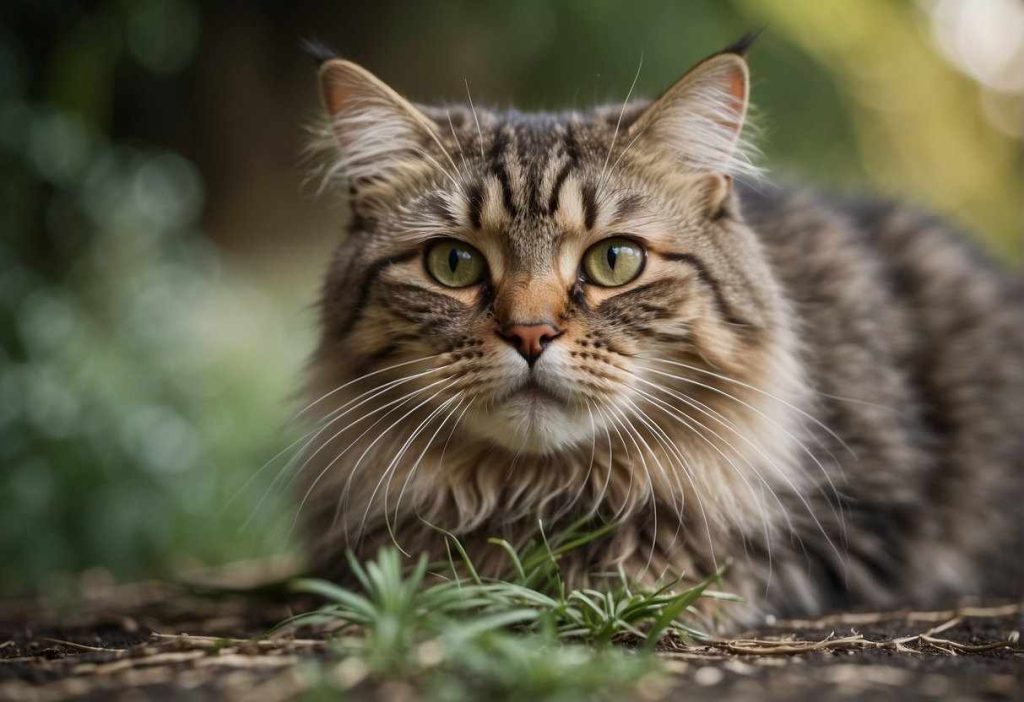
Understanding why your cat is losing fur on their belly requires a keen eye for their behavior and symptoms. It might be something simple like a flea infestation or something more complex like an allergy or anxiety.
Watching for other signs of discomfort and seeking a veterinarian’s diagnosis is crucial, as is exploring the right treatment to get your kitty’s belly fur back to its full glory.
Key Takeaways
- Identifying the cause of belly fur loss is crucial for proper treatment.
- Watch for other symptoms that may accompany hair loss.
- Consulting a veterinarian is essential for a correct diagnosis.
Understanding the Basics of Cat Losing Fur on Belly
What Causes Cat Losing Fur on Belly?
Hair loss, or alopecia, on a cat’s belly, could be due to a few culprits:
- Allergies Think of allergies like an itch that just won’t quit. Cats can be allergic to all sorts of things from fleas to food and even to their cozy beds. When an allergen turns up, your cat’s immune system goes on the defense, often leading to irritation and hair loss in sensitive areas like the belly. (1)
- Parasites Pesky intruders like fleas and mites are the ultimate party crashers. They can cause your kitty discomfort and lead to scratching and hair loss. A telltale sign is if your cat’s skin looks like a flea circus has set up camp. (2)
- Stress or Anxiety Is your cat acting like a drama queen, or rather, king? Stress and its sidekick, anxiety, can prompt excessive grooming. Over-grooming acts like a hair eraser, especially on the belly which cats can easily reach. (3)
- Diseases Sometimes, things get more serious. Conditions like hyperthyroidism or ringworm can result in hair waving goodbye. (4)
The Role of Behavioral Factors in Hair Loss
Have you ever seen your cat licking their belly like it’s their job? It could be a sign they’re trying to soothe themselves from stress.
Look out for other signs like hiding more than usual or changes in their eating habits.
Remember, your cat’s belly is soft, and the skin there is quite delicate. Keep an eye out for any changes, and if in doubt, call your vet. It’s better to be a cautious cat parent than to make your kitty uncomfortable.
And who knows? With your help, they could be flaunting a fluffy belly again in no time!
Recognizing Symptoms and Seeking Diagnosis
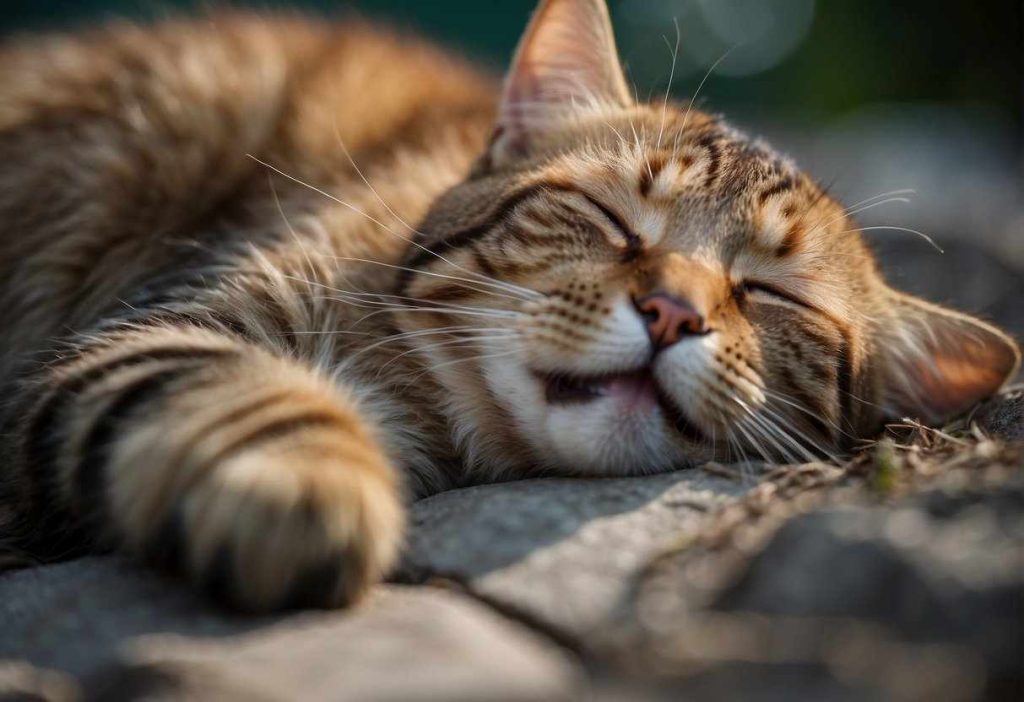
Has your furry friend been looking a little… less furry on their belly lately? It’s not a new fashion statement; your cat might be experiencing hair loss, known as alopecia. (5)
Let’s paw through the signs so you can become the best detective for your little buddy’s belly blues.
Identifying Symptoms of Hair Loss:
- Bare Spots: Seeing more skin than fur? Check if you notice any areas where the fur is thinning or entirely gone.
- Red or Irritated Skin: Is your cat’s belly skin looking angry? Redness or bumps could accompany the hair loss.
- Over-grooming: Is your cat constantly licking their belly? Excessive grooming might be the culprit.
- Changes in Behavior: Acting grumpier than usual? Discomfort from skin issues could affect your cat’s mood.
The Importance of Veterinary Diagnosis:
Notice anything unusual? Here’s why you should phone up the vet:
- Early Detection: You’re the MVP in spotting changes early. The sooner, the better for your cat’s health.
- Expert Insight: Your vet’s trained eyes can see beyond the belly-baring.
- Possible Tests:
When fur flies off that belly, remember to remain calm. Most importantly, don’t play Dr. Cat Whisperer at home – leave it to the pros. You can give mineral oil to your cat to maintain its fur.
Scoot over to your vet and get your purr pal the help they might need. A healthy belly means more happy tummy rubs, right?
Exploring Treatment Options and Home Care
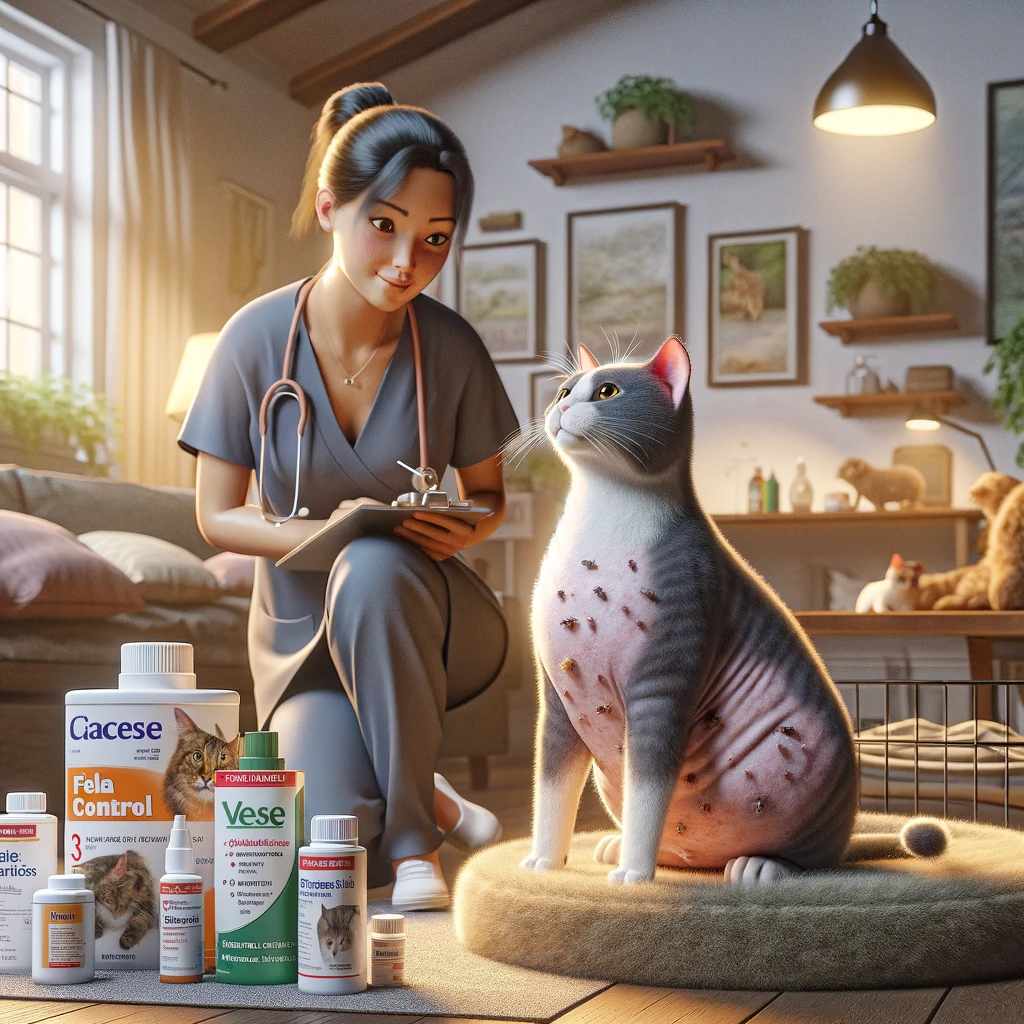
Let’s get into some treatments and home care tricks to help your kitty’s coat get back to fabulous.
Medical Treatments for Hair Loss
If parasites like fleas or mites are throwing a party on your cat, simple treatments like flea control might just be the RSVP to end that shindig.
Sometimes, it’s a skin infection like ringworm, and that’s when your vet can prescribe antifungals. (8)
Now, things might get more complex if it’s something internal like allergies or a hormonal imbalance. Diet changes are a fantastic start. Adding omega-3 fatty acids can turn your cat’s coat from blah to brilliant.
While monitoring your cat for hair loss on their belly, it’s also vital to be vigilant for signs of cat conjunctivitis, such as watery eyes or redness, as these symptoms can sometimes accompany skin conditions and indicate broader health issues.
And keep your eyes peeled for environmental changes; maybe it’s that new cleaner making your kitty itch?
Effective Home Care Strategies
First off, regular grooming is key. You’ve got to keep that coat smoother than a jazz tune. A soft brush can work wonders and bonding time—is a bonus!
Got a stressed kitty? Creating a zen zone with their favorite toys and a cozy bed might chill them out. Remember, a relaxed cat is a non-itchy cat.
Let’s talk diet—because what goes in, shows on the skin. High-quality, balanced norms are the secret sauce for a lush coat. Think about it: good eats equal great fur.
And remember:
- Groom gently
- Curb the stress
- Feed right
Got it? Now, let’s transform your cat from bald to beautiful!
Preventive Measures for Hair Loss
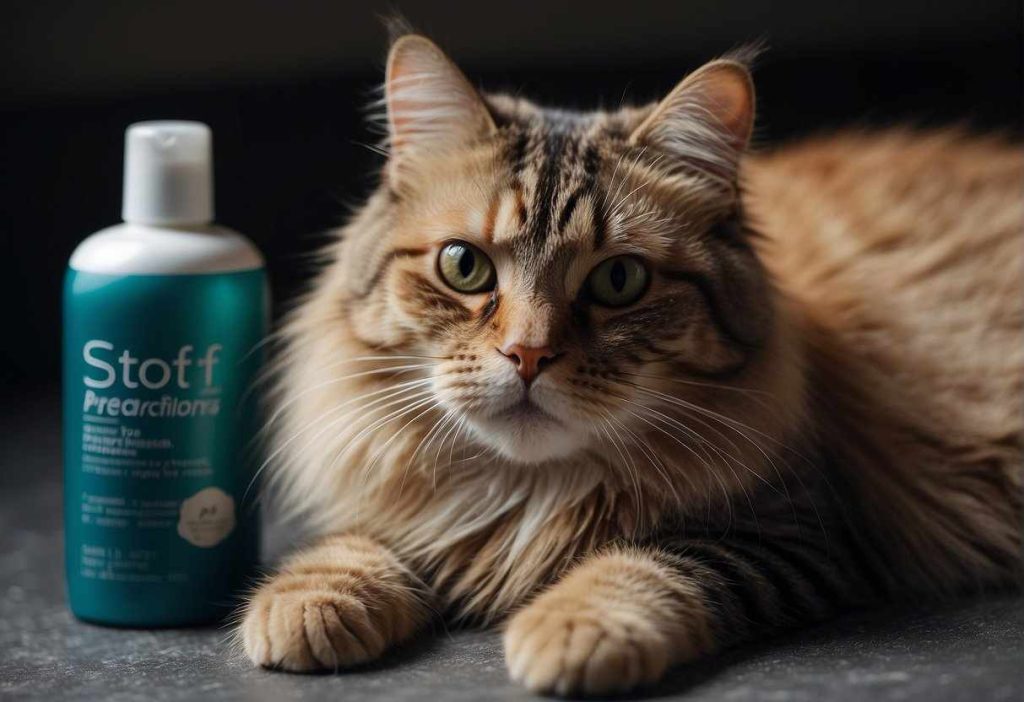
Hair loss can be a real head-scratcher, but don’t worry—you can do plenty to help your cat keep their coat thick and luxuriant.
Here’s the scoop on preventing hair loss in cats.
Lifestyle Changes:
- Start with the basics: Nutrition. Just like us, cats need a balanced diet to keep their skin and fur in top shape. Look for high-quality cat food that’s rich in Omega-3 and Omega-6 fatty acids. Think of it as a fur fertilizer!
- Regular Grooming is key. Brush your cat daily to keep their coat shiny and to reduce the chance of hair tangling and matting. Plus, it’s a great way to bond with your kitty.
Stress Management:
- Cats are Zen masters, right? Well, sometimes they need a little help maintaining their cool. Create a stress-free environment with plenty of cozy hideaways and perches.
- Toys and regular playtime keep your cat active and stress at bay. Remember, a happy cat is less likely to over-groom.
Environmental Factors:
- Parasites are party poopers. Use flea and parasite prevention treatments after consulting your vet. It’s like throwing a bouncer at the door to keep the unwanted guests away from your cat’s skin.
| Checklist for "No More Hairballs" |
|---------------------------------------|
| High-quality diet
| Daily grooming routine
| Stress-free environment
| Regular vet visits
| Flea and parasite prevention
Remember, your vet is your ally in the fur fight. Schedule regular check-ups to keep things smooth, and not just your cat’s fur, but your life as a cat owner too!
Don’t overlook these simple steps; they make all the difference in keeping your kitty’s coat cute and cozy. Just picture your cat’s belly fur, all soft and luscious—that’s the goal!
Keep up the good work, and here’s to no more bald patches!
Expert Insights and Community Experiences
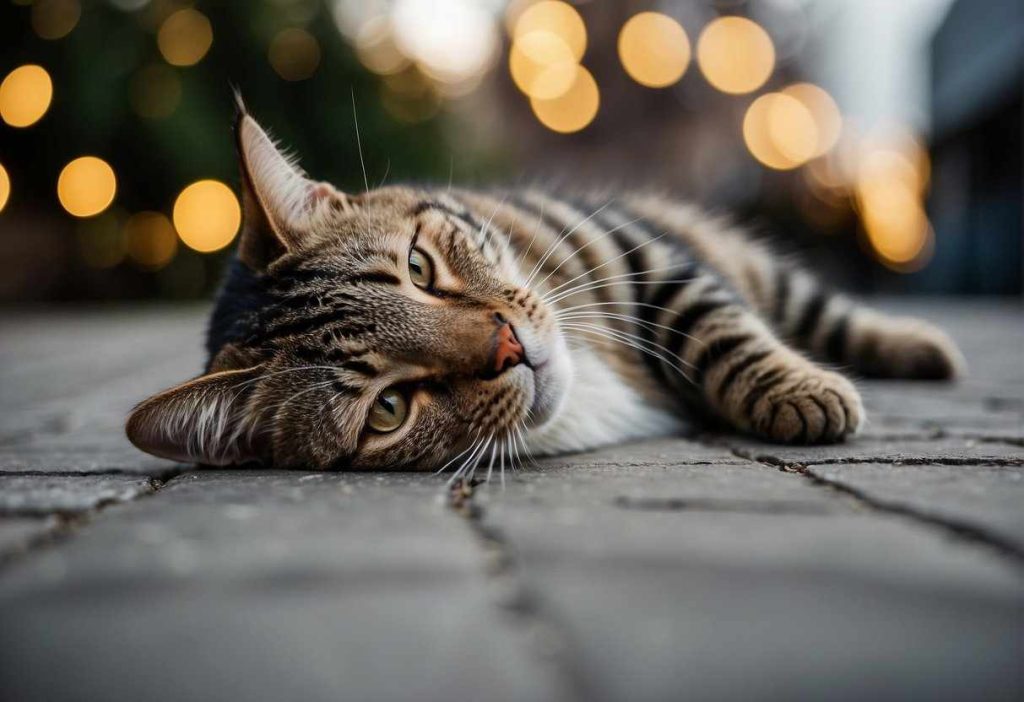
Many cat owners have shared their experiences online about their cat’s fur problems. Before you start worrying, let’s see what the experts and communities say.
Expert Opinions:
- Veterinarian Insight: A visit to the vet should be your first step. Vets often point to common culprits such as flea allergy dermatitis, which can cause intense itching and lead to fur loss. Alternatively, less common conditions like alopecia universalis, where a cat is born without hair, could be the reason.
- Treatment Guidance: Based on professional diagnostics, your vet might recommend specific treatments or dietary adjustments. These steps are crucial because guessing can exacerbate the issue.
Community Support:
- Online Forums: Jumping onto platforms like TheCatSite can provide you with a wealth of anecdotal advice. For instance, owners discussing their cat’s fur loss on the belly can lead you to discover a wide range of non-threatening causes.
- Local Pet Groups: Engaging with local pet owners can give you direct insights into the veterinary services available in your area, as well as share effective remedies.
Remember, although these resources are invaluable, they should not replace professional veterinary advice. Here’s what you can do:
- Create a Checklist:
- Symptoms: Note any other symptoms like itching or changes in behavior.
- Environment: Assess your home for potential allergens or stressors.
- Exchange Tips:
- Prevention: Share and learn about flea control from community experiences.
- Comfort: Gather ideas on how to keep your cat comfortable if they’re experiencing skin irritation.
So, get chatting with your vet and fellow cat enthusiasts! Your furry friend’s tummy may be back to its usual fluffy state sooner than you think.
Quick Recap
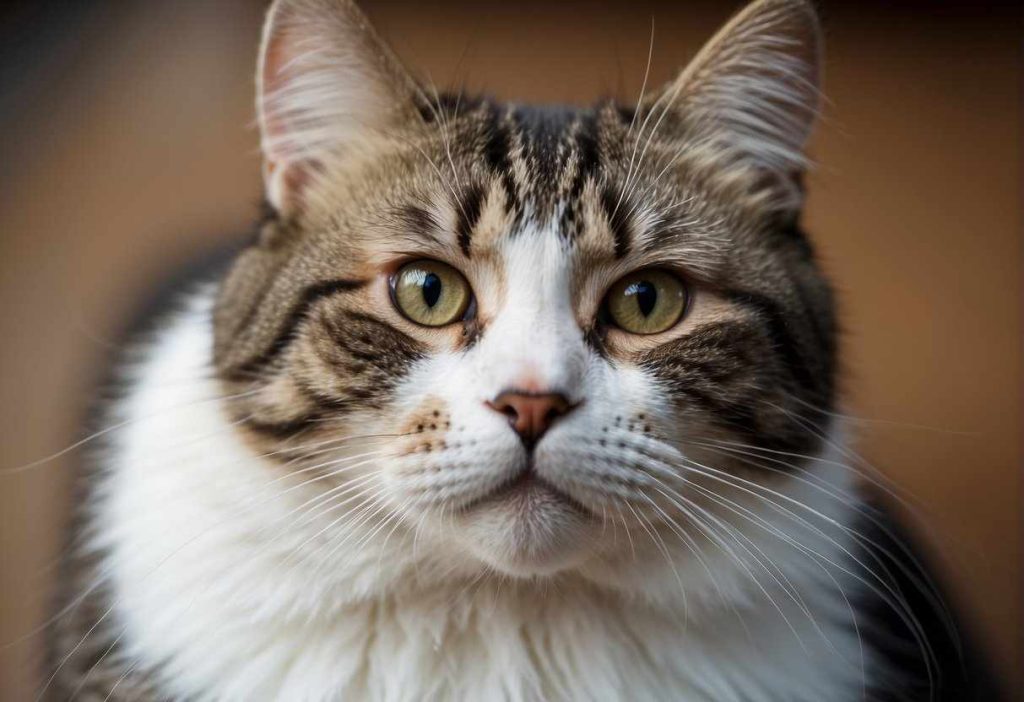
When you’ve noticed your feline friend losing fur on their tummy, it might have left you scratching your head – just like them! Let’s brush through the whiskers of knowledge we’ve gathered:
- Skin Parasites: Much like an unwelcome guest, parasites like fleas, ticks, or mites might set up shop on your cat’s skin, causing itchiness and hair loss through excessive grooming.
- Allergies: Cats can be divas with their sensitive skin. Allergies, whether to food, the environment, or pests like fleas, may trigger overgrooming and fur loss.
- Stress and Anxiety: If your home’s peace is disturbed, perhaps by a new pet or moving houses, your cat may respond by, you guessed it, licking their fur off.
- Medical Conditions: Sure, nine lives give leeway, but health issues such as hormonal imbalances, fungal infections like ringworm, or even something more dire could be the uninvited culprit.
Here’s what you should remember:
- Check the Symptoms: Notice bare patches? Spot excessive grooming? Time to turn detective and investigate.
- Vet Visit: Like a superhero in a white coat, your vet will swoop in to diagnose and treat the issue, offering professional advice.
- Proactive Care: Regular checks, a balanced diet, flea prevention, and a stress-free environment can all contribute to keeping your cat’s coat as majestic as they feel.
By understanding the root of the problem and seeking expert help, you can aid your cat in regaining their full, fluffy glory. Be your cat’s advocate and remember, the fluffier the belly, the more there is to love!
Frequently Asked Questions
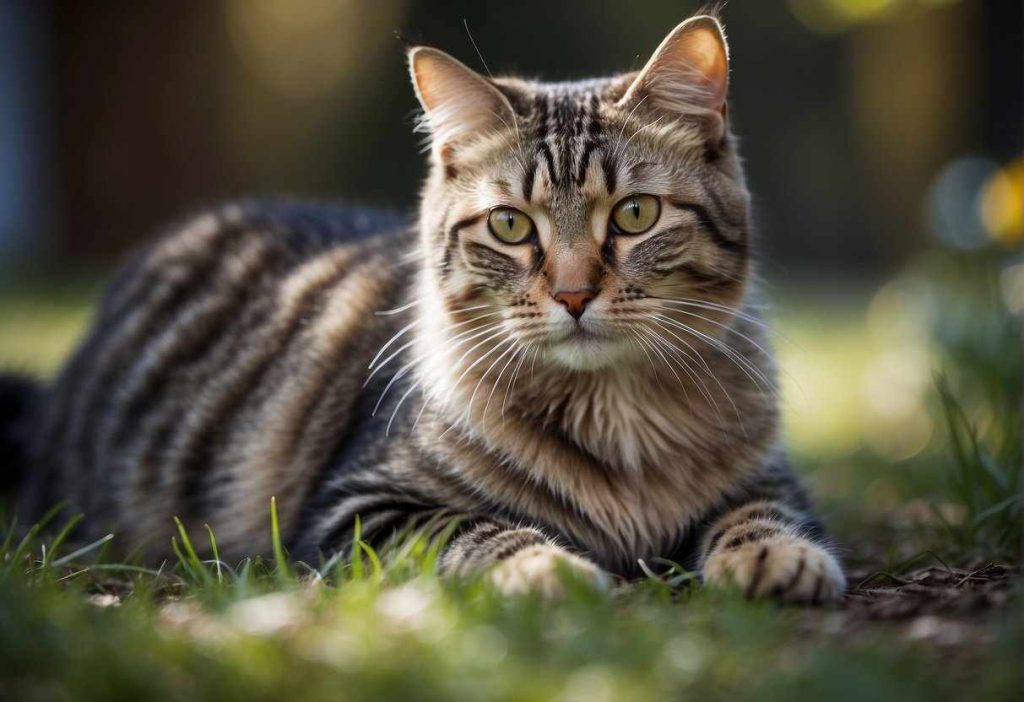
Hair loss in cats can be perplexing, right? You’re not alone in wondering why your feline friend might be losing fur on their belly. Let’s tackle some common queries!
Why is my cat losing fur on its belly?
Hair loss on your cat’s belly could be due to many factors, including allergies, parasites, or stress.
The skin underneath should appear healthy, without signs of redness or irritation, if it’s a benign condition.
Can stress cause my cat to lose fur on its belly?
Absolutely, stress can lead to overgrooming, which often results in hair loss. If your cat’s environment has changed recently or they seem anxious, this could be the culprit.
What home remedies can I try for my cat’s belly hair loss?
First, check for fleas and keep your home clean.
Sometimes, adding omega-3 fatty acids to their diet can improve skin health, but always consult your vet before trying new treatments.
How can I prevent my cat from losing fur on its belly?
Keeping up with flea prevention, offering a balanced diet, and ensuring your cat has a stress-free environment can help prevent hair loss. Regular vet check-ups also play a key role.
Are there any specific diets that help with cat hair loss?
A diet rich in essential fatty acids is often recommended for skin and coat health.
High-quality commercial cat foods designed for skin health can sometimes make a difference.
At what point should hair loss in my cat be a cause for concern?
If you notice bald patches, or skin irritation, or if your cat seems in distress, it’s time to visit the vet.
Persistent or widespread hair loss is a sign that something’s up.
Can parasites cause hair loss on my cat’s belly?
Yes, parasites like fleas and mites can cause hair loss due to the itching and scratching they provoke.
Treatment for these parasites can alleviate the itching and reduce hair loss. Remember, you know your cat best.
Keeping an eye on their behavior and health can nip potential issues in the bud. If anything seems off, don’t hesitate to contact your vet.
They’re your ally in maintaining your furry friend’s health and happiness!
- The Ultimate Overview to Actual Cash Gambling Establishments - July 1, 2025


